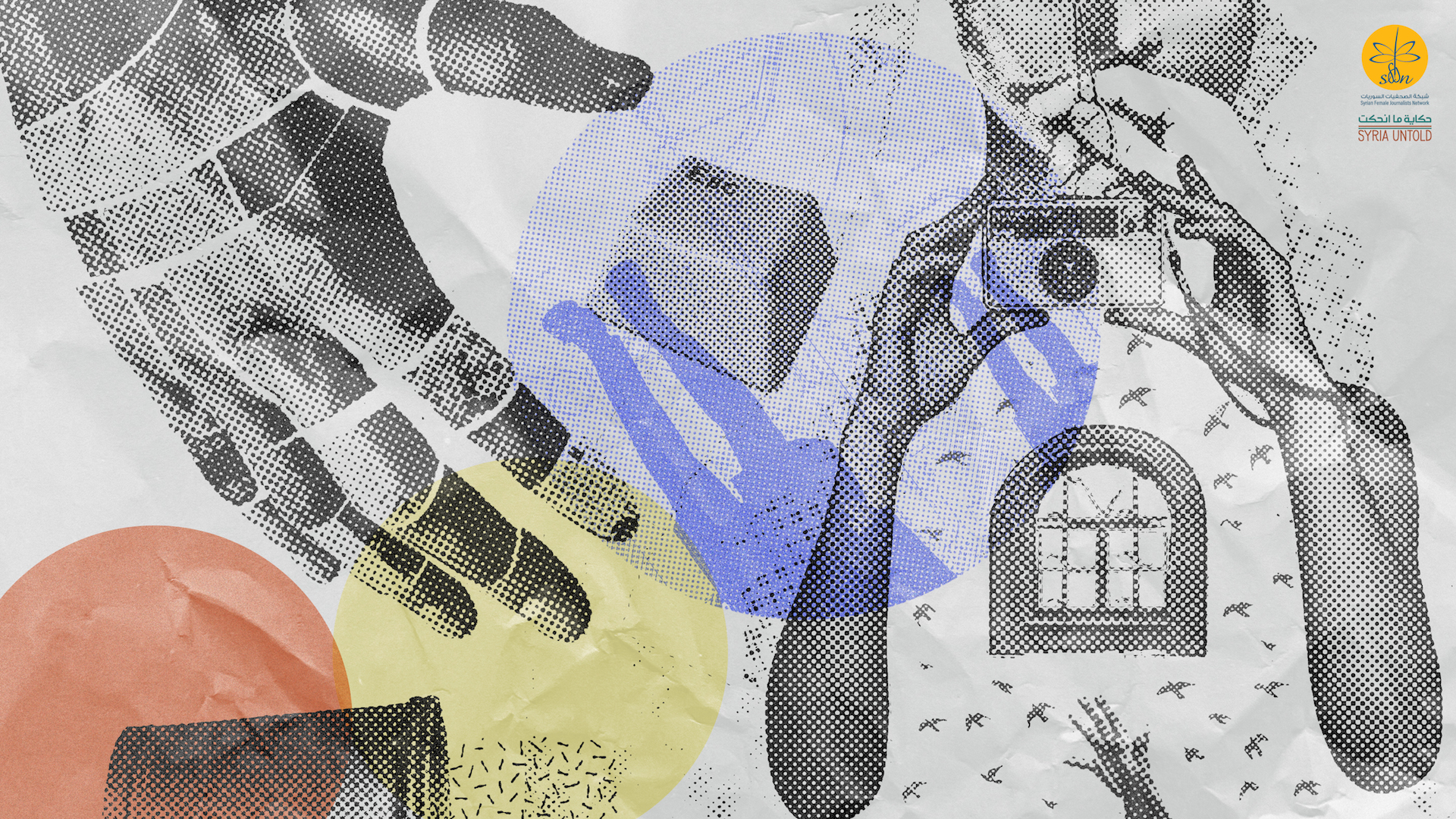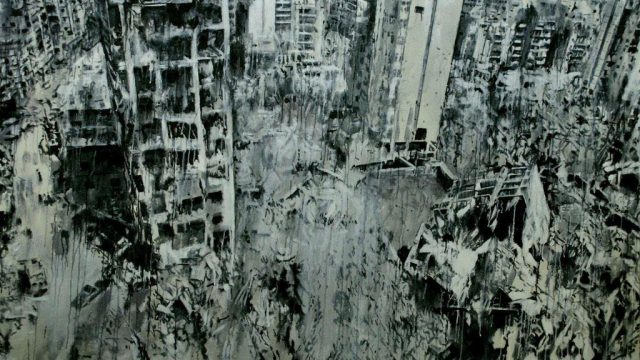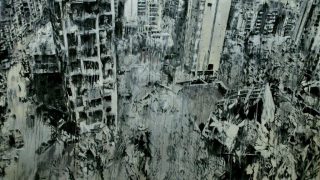If I close my eyes tightly enough, I can feel the warmth of his breath on my cheek as he tries to land a sneaky kiss. I was 12, and he was eight, and had I known how precious that breath was, I would have allowed it, instead of the glaring at him.
He grew into a gangly, gentle introvert. Towards his final years he worked abroad, before he decided to return to his family’s business in Damascus just prior to the onset of the revolution.
As a child he preferred to play with me and my Barbie dolls. We would sit for what seemed like ages sewing and arranging meticulous little outfits for them. But when we grew older, I became more unruly, while he got quieter.
Ayman* vanished into thin air. He was on his way to work in Old Damascus. We learned this from eyewitnesses. His family went from shop to shop, business to business. “Have you seen Ayman?” “They screeched to a halt and started plucking any young man they saw off the street,” they said. Heads pushed forward, bundled into unmarked trucks, microbuses, and that’s it. Gone.
Raqqa, at the center of the universe
16 August 2020
During the war, Ayman’s sister had fled to France with her children and her husband, who works there as a doctor. She contacted me a couple of years ago, and soon afterwards we found ourselves embracing in the coffee shop in Selfridges, a department store in England.
People went about their shopping as she told me what had happened to Ayman. For years his grandmother and mother would go from one security branch to another with his photo. At times the family would sedate his mother with medication for her grief. His father, so cheerful in my memories, stopped cracking his jokes. There were the empty leads, those who sought payment in exchange for false hope.
The death certificate finally came four years after his disappearance. He had died a couple months into detention. There was nothing about where his remains lay. I don’t know what was worse: the not knowing, or the final realization that my friend had likely been tortured to death. Every once in a while, his face visits my nightmare, void of his eyes. The image haunts me. He was so beautiful, healthy and alive. Now all I have is a ghost.
Not long ago I was shocked to hear from yet another person from my past, this time through social media. Syrians on Facebook who are vocally pro-revolution will often follow those in line with their views. A preliminary glance and then you click “confirm.” And they get lost among the rest of your anonymous friends.
A mutual friend highlighted to me that this person possibly knew me, and that he was a former detainee. A few weeks down the line I decided to message him. I don’t think I can pinpoint the exact reason why. Impulse? Wanting to talk to someone who could help me understand what had happened to Ayman? How many people had I lost? Swathes of my past were swallowed by darkness.
Farrah: Hello.
He typed back.
Tarek: Hello.
He said we went to the same school, that he recognized my photo.
I wasn’t convinced. Maybe he had mistaken me for someone else. Our annual visits to Damascus ceased in 2011, until I ventured back in 2017 for a brief visit. I wanted to return for good, but the onset of the revolution derailed this plan. I felt displaced from where I truly wanted to be.
Farrah: Most of my life has been here in the UK.
Tarek preferred I not mention where he lives nowadays.
Tarek: Yes I remember. We met in a swimming course. Unfortunately I have a very strong memory!
I did, in fact, take that swimming course back in Damascus.
Tarek: You were very brave, you jumped off the highest diving board.
To be honest, the jump wasn’t out of bravery but some sort of metaphorical choice. Do you jump into the unknown, or stay where it’s safe? The teacher challenged us and I volunteered. It didn't look that high from the ground. I was scared. I closed my eyes, screamed and launched myself into the air. The water crashed into my limbs, and I looked up towards the surface. It seemed so far off.
I had so many questions for Tarek. He had been detained several years back, on trumped up charges of involvement in terrorist activity. They took him from his office. Then began his journey from one security branch to the next, stopping over in the notorious Sednaya prison before security guards carted him off elsewhere.
Farrah: Did they hurt you?
Tarek: Thanks be to God, I got through it.
Farrah: You are a strong man to be this positive.
Tarek: God allowing.
Farrah: You must have seen a lot, and you must have so much that needs to be said.
Tarek: In those places, Sednaya and the like, there is no understanding of what a human being is. It’s hard to safeguard your own humanity. You become an animal, just trying to cling onto life. There is no mercy. Yet there were and are rare instances of selflessness that some of the men demonstrated. As I said, people become animalistic in their desire to stay alive. Men would fight over morsels of food and water or even the queue to the toilet. There would be fights over who was going to receive the next punishment, as we were all at risk. Men would try to evade this by pushing others to the forefront.
A psychologist friend of mine once told me that the best way to grieve the dead is to touch their bodies. In Islamic burials, we wash our loved ones with our own hands, we bathe them in jasmine, we wrap their shrouds, we say goodbye. How can you grieve those whose bodies have been stolen? How can you grieve those who do not say goodbye?
Tarek: But there were rare instances of humanity, bravery and sacrifice. Those who took punishments in place of those who were physically or mentally weaker. Those who would give up their food. Those who would clean another’s wounds. Those who would listen to the laments of their fellow detainees. But I always looked to the future. It was wrong for me to be a prisoner of what I endured, to be incarcerated in my suffering. To wallow and perceive myself as the victim. I looked to the future, I tried to help others. It is a period of my life that has passed, and the world has not ended for me yet. The road ahead is still very long. There is a part of me that is tired of talking on the subject, maybe this is wrong, but I want to look forward.
I asked him about Ayman.
Farrah: He was taken around the same time as you.
Tarek: No. I’m sorry. I haven’t heard of him.
Of course it was stupid of me to ask, how would he know? I guess I wanted some sort of reassurance that Ayman hadn’t suffered terribly, that I could lay him to rest somehow.
I don’t even know why I am writing this article. Does the world actually care?
In Koblenz, Germany, two former Syrian intelligence officials are being tried for alleged crimes against humanity, for their roles in overseeing torture in Syria’s prisons. The testimonies remind me of Nazi Germany, the trucks laden with hundreds of bodies. One witness, a gravedigger, described the body of a woman cradling her infant. Which grave now cradles my friend?
I lay in bed that night not knowing what to make of my conversation with Tarek. I felt a rush of shame. Shame in my ability to ride my bicycle along tree-lined roads, the wind in my face. To move from one room to the next unshackled.
Tarek had grasped at me through our shared memory of me throwing myself into a pool. When I apologized later for being invasive, he deflected. “No, not at all, it’s just that I don’t like to talk about the details. I don’t want to be portrayed as a victim, or weak. That’s not my message.” If anything, Tarek dazzled me with his strength of character.
Farrah: Can I write about this all, Tarek?
Tarek: What is your message?
To give Tarek a voice. To remember my friend, Ayman, to try and make peace with those things that I wish I could unsee, things that are too painful for me to visit yet, to remember my brother, my brother, my brother. Why did you run towards the rubble? To tell my dear departed brother, “Find Ayman, kiss his eyes for me and tell him I say hello, tell him I haven’t forgotten his name.”
*All names have been changed for safety reasons.
Editing by Madeline Edwards






